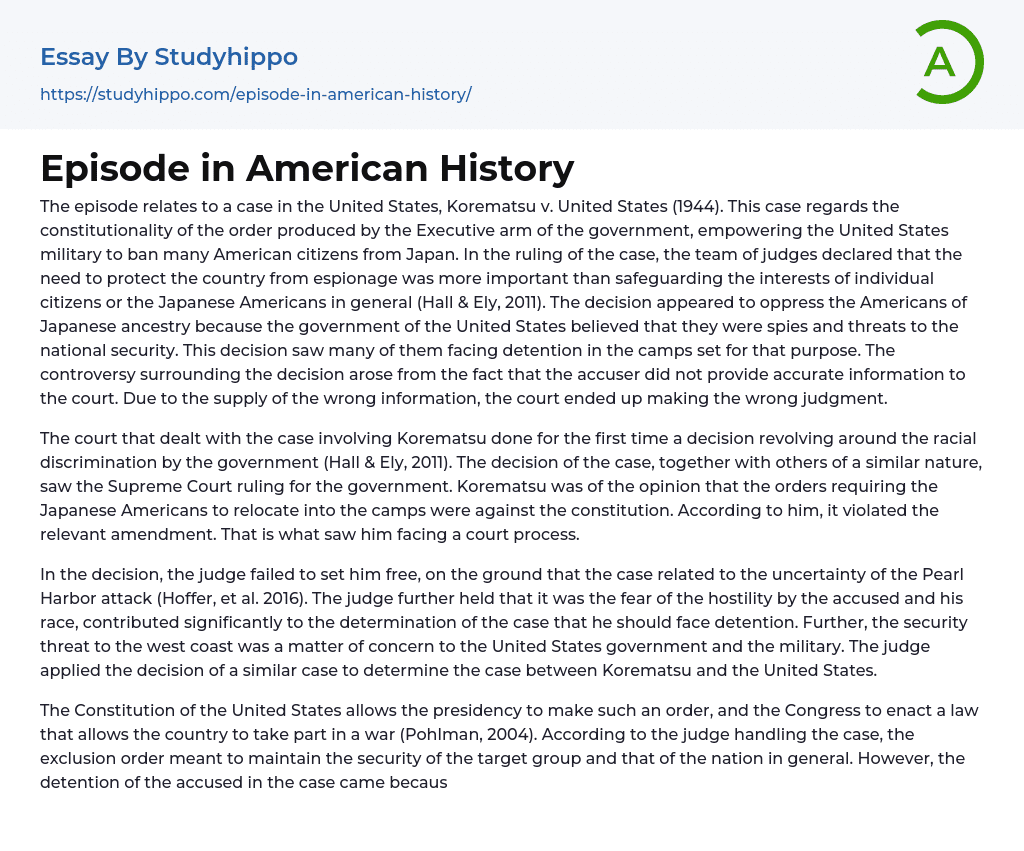The topic of discussion in this episode is Korematsu v. United States (1944), a case that took place in the United States.
The case in question is focused on the constitutionality of an order issued by the Executive branch, which authorized the US military to prevent a significant number of American citizens from Japan. The judicial panel's ruling prioritized safeguarding the nation against espionage over upholding the rights of individual citizens or Japanese Americans collectively (Hall ; Ely, 2011). This decision was seen as oppressive by individuals with Japanese ancestry, as they were perceived by the US government as potential spies and security risks. Consequently, numerous individuals were confined in designated camps.
The controversy arose because the accuser provided inaccurate information to the court, resulting in an incorrect judgment. The court handling the Korematsu case made a groundbreaking de
...cision regarding government racial discrimination. This decision, along with others of its kind, led to the Supreme Court ruling in favor of the government (Hall ; Ely, 2011).
According to Korematsu, the orders mandating Japanese Americans to relocate to internment camps were unconstitutional because they violated a specific amendment. Korematsu's belief in this led to him undergoing a court process where the judge ultimately did not release him due to the case's connection to the uncertainty surrounding the Pearl Harbor attack (Hoffer, et al.).
The judge's ruling in 2016 stated that the accused's fearfulness and racial background were key factors in determining his detention. Furthermore, both the United States government and military expressed concern about the security threat posed to the west coast. In reaching a decision for Korematsu v. United States, the judge relied on a previous case's outcome. The
Constitution grants authority to the president to issue such orders, while Congress can pass laws enabling participation in war (Pohlman, 2004). According to the judge, the exclusion order aimed at safeguarding both the targeted group and national security as a whole.
Although of Japanese American descent, the accused individual was arrested for failing to comply with the exclusion order. The military suspected that they may have had hidden intentions that posed a threat to national security. When examining the constitutional aspect of this case, the Supreme Court made an erroneous decision based on unchecked information. Only later did they become aware of their error. Consequently, I contend that the ruling in this case infringed upon the constitution.
The incarceration of thousands of Japanese Americans was a clear violation of both the law and their rights, as confirmed by a court ruling. Furthermore, there was no substantial evidence connecting Japanese Americans to the Pearl Harbor attack. Consequently, I believe that this entire situation infringed upon the targeted group's rights and damaged America's reputation in terms of upholding the Constitution and Rule of Law.
References
- Hall, K. L., & Ely, J. W. (2011). The Oxford companion to the Supreme Court of the United States. Oxford etc.: Oxford University Press
- Hoffer, P.
C., Hoffer, W., Hull, N. E. H., Supreme Court Historical Society, and Federal Judicial Center. (2016). The Federal Courts: An essential history.
L. (2004). "Constitutional debate in action." Lanham: Rowman & Littlefield Publishers.
- Abolitionism essays
- Adam Smith essays
- American History essays
- American Revolution essays
- Ancient Egypt essays
- Articles Of Confederation essays
- Atlantic Slave Trade essays
- Aztec essays
- Benjamin Franklin essays
- Civil Rights Act of 1964 essays
- Civil Rights Movement essays
- Civil war essays
- Cleopatra essays
- French And Indian War essays
- Gettysburg essays
- Great Depression essays
- Hurricane Katrina essays
- Industrial Revolution essays
- Jamestown essays
- Manifest Destiny essays
- Mccarthyism essays
- Patrick Henry essays
- Pearl Harbor essays
- Pocahontas essays
- Prohibition essays
- Pyramids essays
- Salem Witch Trials essays
- Slavery essays
- The New Deal essays
- Thirteen Colonies essays
- Westward Expansion essays
- Animal Cruelty essays
- Charles Manson essays
- Crime Prevention essays
- Crime scene essays
- Criminal Justice essays
- Criminology essays
- Cyber Crime essays
- Damages essays
- Detention essays
- Distracted Driving essays
- Drug Trafficking essays
- Drunk Driving essays
- Forensic Science essays
- Gang essays
- Hate Crime essays
- Homicide essays
- Identity Theft essays
- Juvenile Crime essays
- Juvenile Delinquency essays




